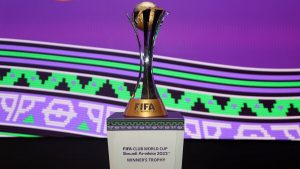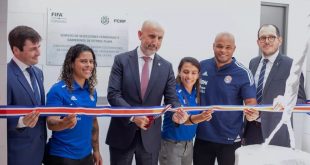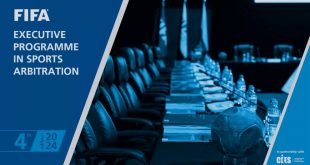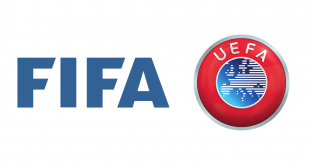 From the moment Al-Ittihad FC and Auckland City FC kicked off the FIFA Club World Cup 2023 at the King Abdullah Sports City Stadium, FIFA’s Technical Study Group (TSG) have had their eyes and minds focussed fully on events on the pitch in Saudi Arabia.
From the moment Al-Ittihad FC and Auckland City FC kicked off the FIFA Club World Cup 2023 at the King Abdullah Sports City Stadium, FIFA’s Technical Study Group (TSG) have had their eyes and minds focussed fully on events on the pitch in Saudi Arabia.
The role of the TSG – an expert panel made up of former coaches and players – is to observe matches, pinpoint tactical trends and innovations, and illustrate them using insights and data from the Football Performance Insights teams. The trends are then presented on fifatrainingcentre.com, and are accessible to all free of charge. Individual award winners, such as the Golden Ball and Golden Glove, are also selected by the TSG.
Inside FIFA spoke with Harry Lowe, one FIFA’s Football Performance Analysts, and a member of the Technical Study Group’s Insights team at the tournament.
From an analysis perspective, what sets the FIFA Club World Cup apart?
Harry Lowe: “The FIFA Club World Cup™, a tournament designed to crown the best club team in the world, stands out for its global representation. While each confederation has its own version of a Champions League within each respective region, the FIFA Club World Cup brings together teams from across every confederation, creating a dynamic and unpredictable tournament.”
What else makes this tournament so exciting?
Harry Lowe: “One of the other unique aspects of the FIFA Club World Cup™ is its timing, with some clubs participating in the competition still in the midst of their domestic seasons. Unlike traditional international competitions where teams often arrive after finishing their seasons, clubs like Manchester City FC and Brazil’s Fluminense FC find themselves in mid-season form, competing both domestically and internationally.
“What this means in practice is that the squads are playing at their peak performance: participation mid-season means teams can carry across current form from their domestic competitions, and arrive in peak physical condition.”
And what do these things mean together?
Harry Lowe: “Teams accustomed to facing familiar opponents week in and week out suddenly find themselves up against clubs they rarely encounter. This dynamic adds an extra layer of intrigue to the tournament, as the analysis team contemplates how these in-season clubs adapt to the unique challenges posed by unfamiliar opponents.”
Who is on the Technical Study Group for the tournament?
Harry Lowe: “This tournament welcomes a team of two to the Technical Study Group: Pascal Zuberbühler and Christian Gross, a former player and manager who has previously managed Al-Ahli, and has extensive knowledge of teams based in Egypt and the surrounding region. This insight and regional expertise will be invaluable for the team as we progress into the tournament.”
How does the size of the tournament change the Technical Study Group’s approach?
Harry Lowe: “The condensed nature of the competition [seven teams and seven matches across 10 days] amplifies the focus on individual match analysis and performance rather than the global view.
“Basically, what this means is the Technical Study Group have less opportunity to identify trends across the tournament as a whole, but rather focus their analysis on the tactical matchups and the strategic nuances within each individual game.
“This shift towards micro-level analysis provides a unique perspective on how teams adapt to specific opponents, offering insights that go beyond a global overview.”
 Arunava about Football A look at football & the world through my eyes!
Arunava about Football A look at football & the world through my eyes!



